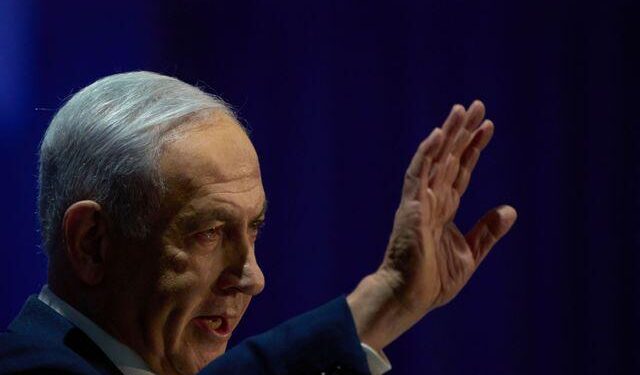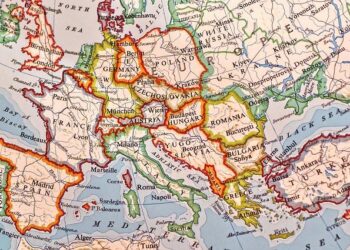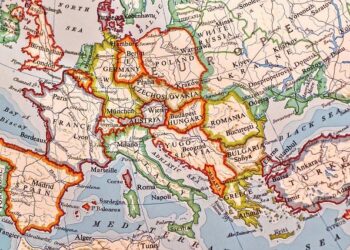In a notable diplomatic maneuver, Israeli Prime Minister Benjamin Netanyahu is set to visit Hungary, marking a bold defiance against teh International Criminal Court (ICC)’s arrest warrant issued against him. The visit, scheduled amid heightened tensions surrounding Israel’s domestic and international policies, raises questions about the implications of such actions on global legal standards and international relations. Hungary’s support for Netanyahu comes at a time when he faces increasing scrutiny over allegations of war crimes related to Israel’s military actions. As countries grapple with the balance between state sovereignty and adherence to international law,this visit will undoubtedly attract attention from both proponents and critics of netanyahu’s administration,shedding light on hungary’s position within the current geopolitical landscape. NTD News explores the ramifications of this visit and what it signifies for international diplomacy, human rights, and the ongoing conflict in the region.
Netanyahu’s Defiance of ICC Arrest Warrant Contextualized
In a bold maneuver that has caught the attention of international observers, Israeli Prime Minister Benjamin Netanyahu is set to travel to Hungary despite the existing arrest warrant issued by the International Criminal Court (ICC). His decision signifies a complex interplay of regional diplomacy and international law, particularly as Netanyahu faces potential judicial challenges regarding accusations of war crimes related to actions in Gaza. The implications of this visit extend beyond mere political bravado; they raise critical questions about the efficacy of international legal frameworks in holding state leaders accountable, especially those who are entrenched in contentious geopolitical situations.
Netanyahu’s defiance sends a clear message regarding Israel’s stance towards the ICC and its decisions, underpinning a commitment to national sovereignty over international mandates. By aligning with certain European nations like Hungary—known for its more sympathetic attitude towards Israel—Netanyahu reinforces his narrative of security and legitimacy. Key factors influencing his visit include:
- Strengthening Bilateral Relations: Aiming to enhance cooperation with Hungary on various fronts.
- Domestic support: Rallying nationalistic sentiments and securing political survival at home.
- Challenging International Norms: Rejecting perceived anti-Israel bias within international legal institutions.
Understanding the Implications of Netanyahu’s Visit to Hungary
The implications of Benjamin Netanyahu’s visit to Hungary are multifaceted and significant, especially considering the backdrop of the International Criminal Court (ICC) arrest warrant issued against him. Hungary’s stance as a member of the European Union raises questions about the bloc’s solidarity on human rights issues, particularly in the context of international law. Observers may interpret Hungary’s decision to welcome Netanyahu as a political statement that prioritizes bilateral relations and strategic partnerships over adherence to ICC directives, thereby challenging the authority of international legal frameworks. This could potentially encourage similar attitudes among other EU nations, who might regard Hungary’s stance as a precedent for justifying disregard for international justice norms.
Moreover, this visit symbolizes a strengthening of ties between Hungary and Israel, indicating shared interests that could influence regional dynamics. Key points to consider include:
- Political Alliances: The deepening cooperation between Viktor orbán’s government and Netanyahu could signal a shift toward more authoritarian governance in the region.
- Immigration Policy: Both leaders have characterized themselves as defenders against immigration,which may lead to aligned policies on borders and asylum seekers.
- Jewish Diaspora Influence: Hungary’s ancient ties with Jewish communities and Israel may enhance support for significant Jewish identity and diplomatic funding.
| Key Points | Potential Implications |
|---|---|
| International Law | Challenges ICC Authority |
| Political relations | Potential Isolation of Hungary Within EU |
| Regional Stability | Increased Support for Nationalist Policies |
Hungary’s Stance on International Law: Analyzing the Political Landscape
The impending visit of Israeli Prime Minister Benjamin Netanyahu to Hungary has stirred significant political discourse amidst the backdrop of his controversial arrest warrant issued by the International Criminal Court (ICC). Hungary, under the leadership of prime Minister Viktor Orbán, has positioned itself as a vocal critic of international legal frameworks, often prioritizing nationalist agendas over global judicial mandates. This visit exemplifies Hungary’s willingness to defy international norms, raising questions about its commitment to the rule of law and human rights obligations. Observers argue that such actions not only challenge the legitimacy of institutions like the ICC but also reflect a broader shift where sovereignty is upheld over international consensus.
Considering this event, it becomes essential to consider the implications of Hungary’s actions for its diplomatic relations, particularly within the EU.By providing a welcoming platform for a leader facing serious accusations, Hungary risks alienating itself from other European nations that uphold the principles of justice and accountability.Key Points to Analyse include:
- Hungary’s diplomatic history with Israel and its implications for bilateral relations.
- The potential feedback from EU member states regarding Hungary’s stance on the ICC warrant.
- How Hungary’s decisions resonate with its domestic political narrative and Orbán’s government.
Additionally, the complexities of international law nuances Hungary’s current political landscape. A closer examination of the situation reveals the delicate balance between national sovereignty and adherence to international legal obligations, prompting a reevaluation of Hungary’s role within both regional and global contexts. This evolving narrative highlights the ongoing tension between global governance, national interests, and how nations choose to navigate this intricate web.
The Role of the International Criminal Court in Global Justice
The foundation of the International Criminal Court (ICC) lies in its mission to promote accountability for grave offenses that disturb global peace and security. The court serves as a crucial mechanism for prosecuting individuals accused of crimes such as genocide, war crimes, and crimes against humanity, particularly when national jurisdictions are unwilling or unable to prosecute. It establishes a standard for international justice, which, while theoretically designed to be impartial and fair, often finds itself in politically charged situations. Notably, controversial figures like Benjamin Netanyahu challenge the court’s authority when they ignore or defy arrest warrants, potentially undermining the very essence of international justice.
In an increasingly interconnected world, the ICC’s role extends beyond mere prosecution; it also entails promoting justice, deterrence, and international cooperation. However, the court’s effectiveness can be hampered by various factors, such as non-cooperation from member states and the politicization of its mandates. some key aspects affecting the ICC’s enforcement capacity include:
- The Principle of Complementarity: Emphasizes that the ICC only intervenes when national courts fail to act.
- Political Resistance: Some leaders may utilize political power to evade judicial processes.
- Member State compliance: Reliance on states to arrest suspects complicates enforcement efforts.
| Challenges Faced by ICC | Potential Solutions |
|---|---|
| Non-compliance from States | Strengthening diplomatic pressure and sanctions |
| Perceived Bias in Prosecutions | Enhancing clarity and communication |
| Lack of Enforcement Mechanisms | Creating coalitions for collective action |
Public Reaction in Hungary: support and Opposition to Netanyahu’s Visit
Reactions in Hungary to Netanyahu’s visit have been starkly divided, reflecting a broader tension regarding Israel’s diplomatic relations in the region. Supporters view the visit as a exhibition of political solidarity, emphasizing Hungary’s stance against international pressure from bodies like the International Criminal Court (ICC). They argue that the invitation signifies Hungary’s commitment to maintain a strong bilateral relationship with Israel, which is perceived as essential for stability and security in central Europe. Key arguments from supporters include:
- Strengthening ties with a key ally in a volatile region.
- Challenging the perceived bias of international legal systems against Israeli interests.
- Promoting mutual economic interests through enhanced cooperation.
Conversely, many citizens and human rights advocates have expressed outrage at the government’s decision to host Netanyahu amid ongoing allegations of war crimes.Opposition leaders and activist groups have organized protests, arguing that Hungary risks undermining its international reputation and moral standing by welcoming a leader under an ICC arrest warrant. Critics assert that netanyahu’s policies towards Palestinians are inconsistent with democratic values, warning of the potential backlash from the European Union and other international communities. Highlighted concerns include:
- Perceived endorsement of military actions that violate human rights.
- Potential diplomatic repercussions for Hungary’s standing in Europe.
- Facilitation of divisive narratives that may fuel extremism.
The Impact on Israel-Hungary Relations: Historical Perspectives
The upcoming visit of Israeli Prime Minister Benjamin netanyahu to Hungary is poised to influence the bilateral relations between the two nations substantially. Historically, Hungary has demonstrated a somewhat supportive stance towards israel, particularly in recent years under Prime Minister Viktor Orbán.This alignment has been characterized by a mutual interest in resisting perceived threats to national sovereignty and exploring economic collaborations. The deepening ties are evident through various initiatives, including joint projects in sectors such as technology and defence. Notably, Hungary’s position within the EU often serves as a counterbalance to broader European criticisms directed towards Israel, suggesting a unique geopolitical alliance.
Though, Netanyahu’s visit comes against a backdrop of heightened tensions due to the International Criminal Court (ICC) warrant. The implications of this diplomatic endeavor may further complicate Hungary’s internal political landscape as well as its relationship with the EU. Hungary has been known for its controversial stances on various issues, and this visit could potentially embolden opposing factions within the country. As the world watches, the impact of this meeting may lead to shifting dynamics not just between Israel and Hungary, but also within European politics at large. Some key points to consider are:
- Historical ties: Support for Israel dating back to diplomatic relations established in 1949.
- Economic collaboration: Growth in joint ventures, especially in the technology sector.
- Political support: Hungary’s unique position as a vocal ally of Israel within the EU context.
Potential Consequences for Israeli diplomacy in Europe
The visit of Israeli Prime Minister Benjamin Netanyahu to Hungary, amidst an International Criminal Court (ICC) arrest warrant, could significantly reshape Israel’s diplomatic landscape in Europe. This bold move may lead to increased tensions between Israel and several EU nations, particularly those that align with the ICC’s stance on accountability for war crimes. In defiance of the warrant, Netanyahu’s engagement with Hungary, a country known for its strong support of his policies, could encourage a rift among european nations regarding their diplomatic relations with Israel, as they grapple with the balance between legal obligations and political alliances.
Moreover, Israel’s diplomatic maneuvering may have long-term implications for its standing in Europe. Increased isolation from certain EU member states could emerge, as diplomatic relations become strained over perceived defiance of international law.As a response, countries that oppose the ICC’s jurisdiction might solidify their ties with Israel, leading to a new geopolitical alignment.This evolving dynamic not only affects Israel’s bilateral relationships but may also influence broader EU policies, particularly concerning foreign relations strategies and human rights standards. The outcomes of such engagements might provoke a recalibration of alliances within Europe as nations react to perceived injustices and shifts in global power structures.
Recommendations for Human Rights Advocacy Groups
In light of recent developments regarding Israeli Prime Minister Netanyahu’s planned visit to Hungary, human rights advocacy groups should consider implementing strategic measures to amplify their voices and increase pressure on national governments and international bodies. The following actions could be considered:
- Public Awareness Campaigns: Launch initiatives that educate the public about the implications of the ICC arrest warrant and what it signifies for international law and human rights.
- Engagement with media: Foster relationships with journalists and media outlets to ensure comprehensive coverage of the situation, highlighting the potential consequences of allowing such visits under an arrest warrant.
- Coalition Building: Collaborate with other organizations globally to create a unified front, advocating for accountability and adherence to international legal standards.
Moreover, advocacy groups should focus on mobilizing grassroots support by organizing petitions and demonstrations to demonstrate public opposition to Netanyahu’s visit. Tailored approaches might include:
- social Media Campaigns: Harness platforms like Twitter and Instagram to challenge the visit and spread awareness, using hashtags to increase visibility.
- Legal initiatives: Explore potential legal challenges or interventions that could be filed in relevant jurisdictions to assert the need for compliance with international legal frameworks.
- Policy Advocacy: Engage with lawmakers to advocate for measures that reinforce adherence to the ICC’s mandates and discuss potential repercussions for nations that ignore these legal obligations.
The Broader Context: Israel’s Position in International Affairs
The recent visit of Israeli Prime Minister netanyahu to Hungary amid an International Criminal Court (ICC) arrest warrant raises significant questions about Israel’s strategic positioning on the global stage. As a nation often involved in contentious diplomatic decisions,Israel continues to navigate a complex web of alliances and international legal challenges. Netanyahu’s defiance of the ICC signals an unwavering commitment to perceived national interests and an assertion of sovereignty, positioning Israel in a unique light within the broader geopolitical landscape.
This situation highlights several key aspects of Israel’s role in international affairs:
- Strong Bilateral Relations: Israel has cultivated robust ties with countries that share its political ideologies, such as Hungary, strengthening its position against Western criticism.
- Legal and Political Maneuvering: The defiance of the ICC warrant is indicative of Israel’s strategy to challenge international legal structures that it perceives as biased.
- Influence of domestic Politics: Netanyahu’s domestic challenges and election considerations play a crucial role in shaping his international strategy.
- Security Concerns: Israel’s focus on national security often overshadows international legal obligations, influencing its diplomatic engagements.
| Aspect | Meaning |
|---|---|
| Diplomatic ties | Bolsters Israel’s standing in the EU |
| Legal challenges | Highlights conflict between national sovereignty and international law |
| Domestic Politics | Affects international strategy and alliances |
Final Thoughts
As Prime Minister benjamin Netanyahu prepares for his controversial visit to Hungary,the implications of this trip extend beyond diplomatic relations,touching on pressing issues of international law and geopolitical dynamics. His decision to defy the International Criminal Court’s arrest warrant underscores the complexities faced by leaders navigating the intricacies of international justice and bilateral relations. Hungary’s welcoming stance reflects not only its political alignment with Israel but also raises questions about the broader implications for european Union unity and the ICC’s authority. As the world watches,Netanyahu’s visit may serve as a pivotal moment in the ongoing discourse surrounding state sovereignty,human rights,and the enforcement of international law. Moving forward, it will be critical to observe how this visit affects Israel’s relationships within Europe as well as the responses from various international institutions.
















